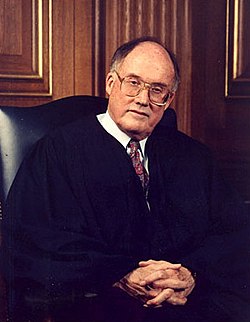William Rehnquist
| It's the Law |
| To punish and protect |
“”[Rehnquist] was funny and charming, very bright and quick. He could give you all the good conservative arguments on any issue. He had no sympathy for criminal defendants — none. When you talked about the problem of the cities or the poor or blacks, it was clear he had no understanding. It was a universe he didn't comprehend.
|
| —Former Supreme Court law clerk Donald Trautman[1] |
William Hubbs Rehnquist (1924–2005) was a far-right Supreme Court Justice first appointed by Richard Nixon as an associate justice, then made chief justice by Ronald Reagan, after getting "the highest negative vote ever received by a confirmed justice" up to that time at 33,[2]:171 which was also the maximum until the Republicans eliminated the filibuster for Supreme Court nominees in 2017.[3] Sexual assaulter Brett Kavanaugh had 48 votes against him in 2018.[4] In 2020, the Republican-controlled Senate removed the filibuster for Supreme Court nominees, knowing that they wanted to ram through nominees who were even more unpopular than Rehnquist (Brett Kavanaugh received He served on the Supreme Court until his death in 2005.[5] He has been described by some as a “rigid conservative,” with one critic of him writing "If you were a homosexual, a racial or religious minority, a woman, an alien, an accused criminal, or someone facing the death penalty, you were not going to get Rehnquist’s vote.”[6] It's also said he voted "with the prosecution in criminal cases, with business in antitrust cases, with employers in labor cases, and with the government in speech cases."[7]:221
Voter suppression in Arizona[edit]
As the Jim Crow era began coming to an end, Black voters began leaving the Party of Lincoln (GOP) for the Democratic Party making the GOP increasingly White. The GOP struggled to win in cities, and concluded from the results of the 1960 election that a new strategy was needed.[8]:304-305 Thus was born Operation Eagle Eye,![]() which focused on the 1964 election in Arizona, which was based on a scheme led by Rehnquist in the 1962 election in Phoenix.[8]:304 The scheme consisted of:[8]:304
which focused on the 1964 election in Arizona, which was based on a scheme led by Rehnquist in the 1962 election in Phoenix.[8]:304 The scheme consisted of:[8]:304
- "Caging", sending mail to registered voters and using any returned mail as the basis for challenging the legitimacy of registrations
- Sending deceptive mailers and phone calls to registered Democrats, stating that they will be arrested if have a traffic violation and they vote, or telling them to vote for Martin Luther King Jr. who was not on the ballot
- Sending GOP "poll watchers" to polling places, specifically to harass minority voters, including both people with "Ballot Security" armbands and uniformed-and-armed off-duty police officers
Operation Eagle Eye became a blueprint for future voter suppression strategies.[8]:304-305
Beliefs[edit]
Rehnquist was infamous for his far-right opinions, especially in his early days on the court, even earning the nickname "The Lone Ranger" due to the frequency of him being the lone dissent in a ruling.[9] He infamously said in 1952, "I think Plessy v. Ferguson was right and should be re-affirmed,"[10] and although he disavowed the article where this was stated, there is have evidence of him defending segregation as a Constitutional right as late as 1993.[11] In 1970, his belief in segregation was so strong that he advocated for a Constitutional Amendment allowing local governments to segregate schools.[12]
Unsurprisingly, his opinions on LGBT people were about on the same level as his opinions on non-white people, to the point where the gay rights organization ACT UP called him one of the major figures in the fight against homosexual rights in the United States at the time.[13] In Ratchford v. Gay Lib, he essentially said that homosexuality is contagious.[14] He sided with the majority in Bowers v. Hardwick, which upheld the constitutionality of sodomy laws.[15] This same logic led him to dissent in Lawrence v. Texas, which overturned the aforementioned case.[16]
References[edit]
- ↑ The Rehnquist Court : Bill Rehnquist Was Once Considered An Extremist. Now His Views Almost Always Become The Law Of The Land.
- ↑ The Clothes Have No Emperor: A Chronicle of the American 80s by Paul Slansky (1989) Simon & Schuster. ISBN 0671673394.
- ↑ Fact check: Republicans, not Democrats, eliminated the Senate filibuster on Supreme Court nominees by Camille Caldera (October 1, 2020) USA Today.
- ↑ See the Wikipedia article on Brett Kavanaugh Supreme Court nomination.
- ↑ William Rehnquist
- ↑ Overruled: How Conservative Was Chief Justice Rehnquist?
- ↑ Bob Woodward & Scott Armstrong, The Brethren: Inside the Supreme Court. 1979. Simon and Schuster.
- ↑ 8.0 8.1 8.2 8.3 "Voter Fraud" by Carol Anderson. In: Myth America: Historians Take On the Biggest Legends and Lies About Our Past, edited by Kevin M. Kruse & Julian E. Zelizer (2022) Basic Books. ISBN 1541601394. Pages 299-311.
- ↑ Reagan's Mr. Right
- ↑ William Rehnquist, "A Random Thought on the Segregation Cases," 1952
- ↑ There’s Unsettling New Evidence About William Rehnquist’s Views on Segregation
- ↑ Rehnquist Wrote School Segregation Memo
- ↑ LGBTQ History Month: The early days of America's AIDS crisis
- ↑ RATCHFORD v. GAY LIB, 434 U.S. 1080 (1978)
- ↑ Bowers v. Hardwick, 478 U.S. 186 (1986)
- ↑ LAWRENCE V. TEXAS (02-102) 539 U.S. 558 (2003)
